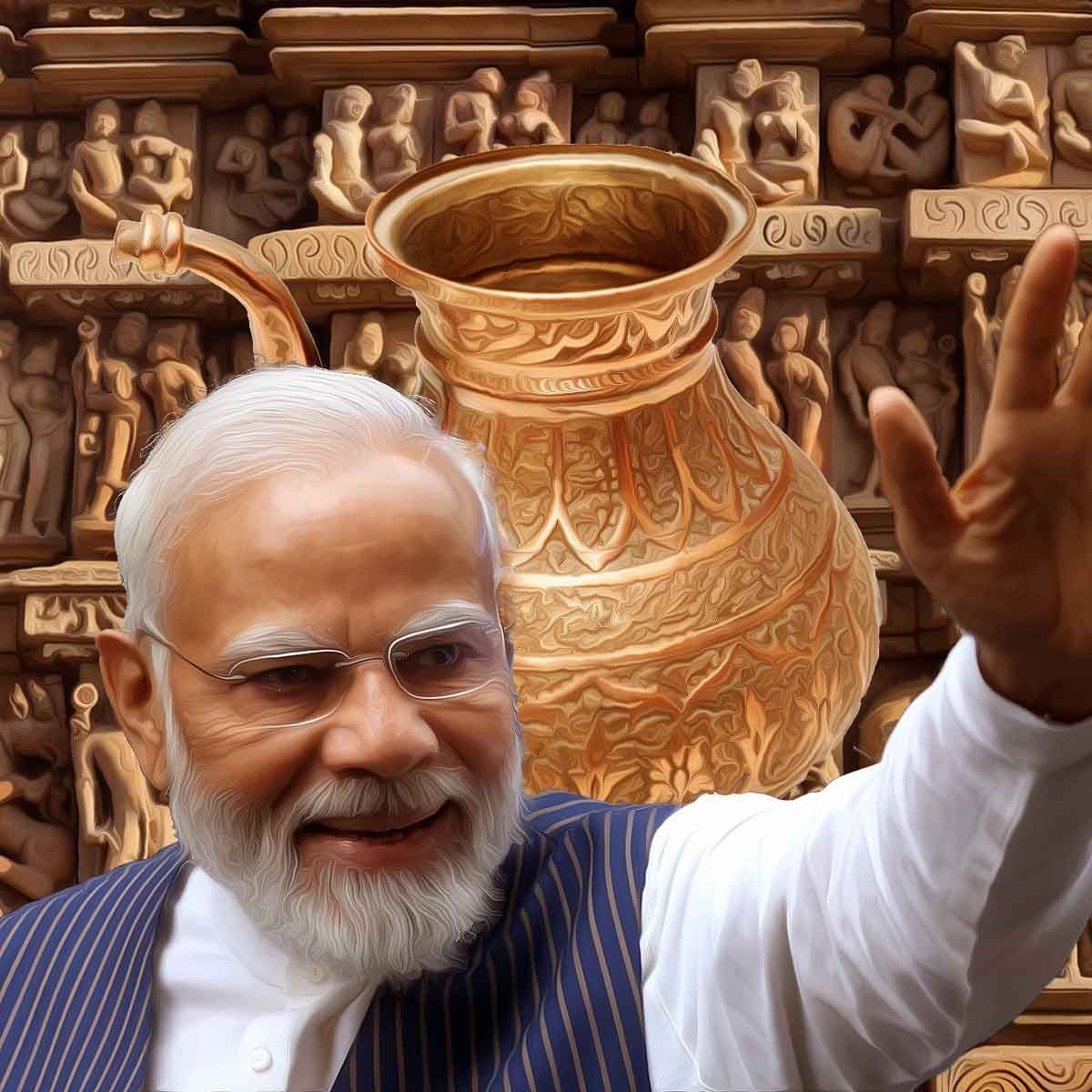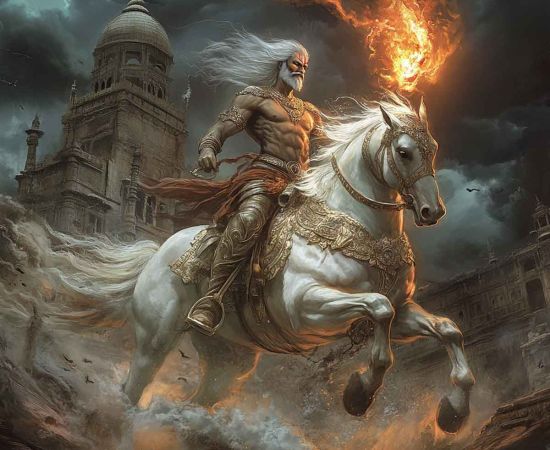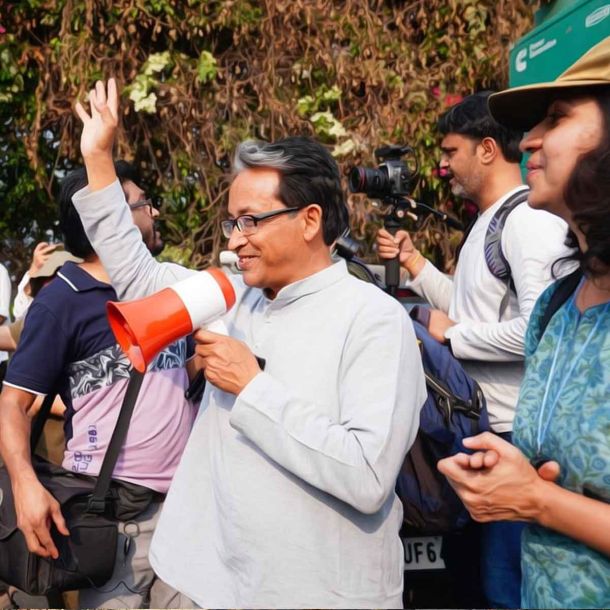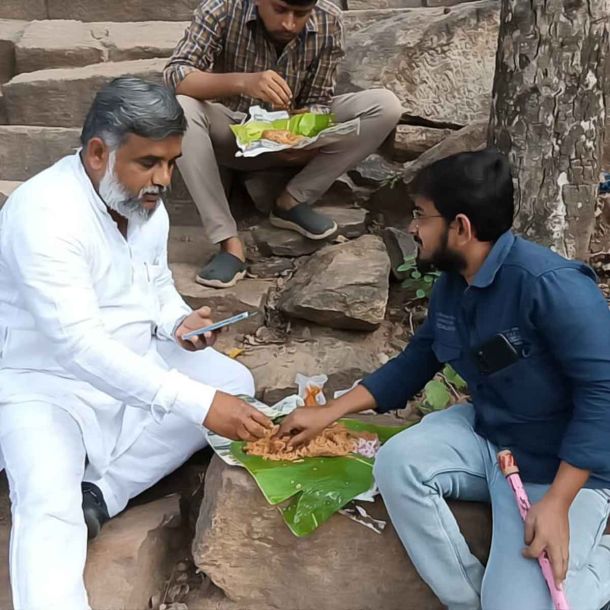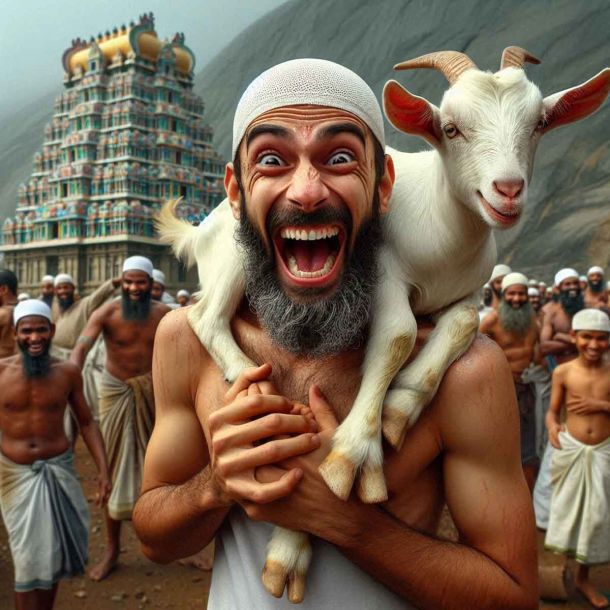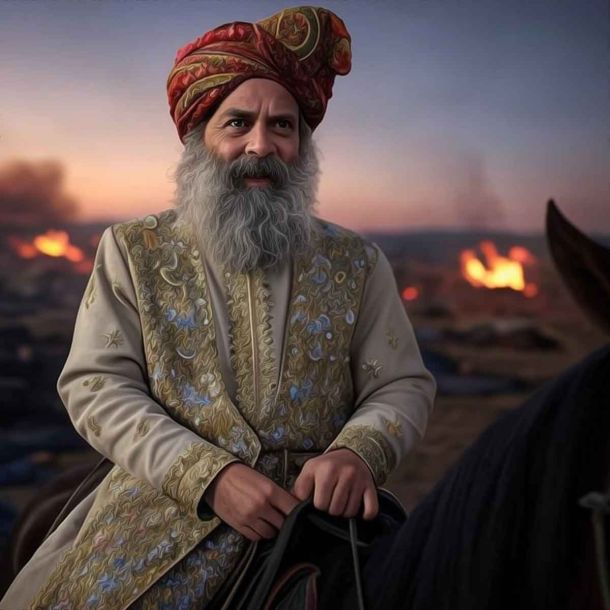MORE COVERAGE
Twitter Coverage
Satyaagrah
Written on
Satyaagrah
Written on
Satyaagrah
Written on
Satyaagrah
Written on
Satyaagrah
Written on
JOIN SATYAAGRAH SOCIAL MEDIA
“When a sinister person means to be your enemy, they always start by trying to become your friend”: Nusrat Fateh Ali Khan known as the ‘King of Qawwali’ was not only a singer but also a closeted Hindu hater, exposed as his anti-Hindu sentiments surface
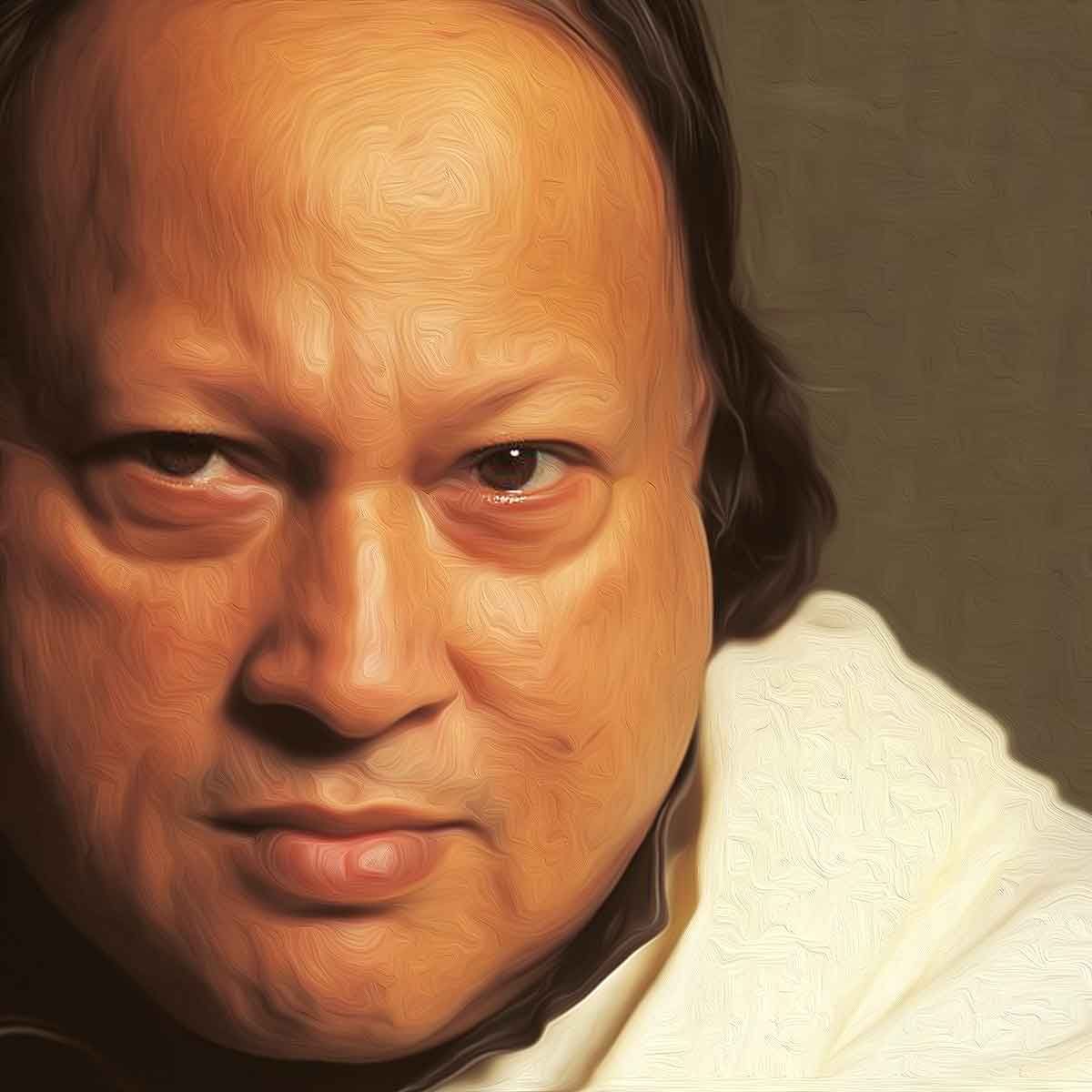
Let us consider what Ram Swarup said about Hindu-bashing, or what is nowadays called Hinduphobia or a more correct word would be Hindumisia. The word, though in existence for more than a century, was not yet in vogue as Hinduism’s ad hoc counterweight against the omnipresent propaganda term Islamophobia. But the phenomenon was already dominant in India and increasingly present abroad.
In fact, it was quite old. Several tribes of Muslims with doctrinally motivated hate for the Hindus, followed by the Portuguese Christians with a similar aversion, had actively persecuted Hinduism for centuries. They represent a permanent source of anti-Hindu violence that now takes the form of occupation of parts of the Hindu homeland by the Islamic states of Pakistan and Bangladesh; Pakistani incursions; terrorism and rioting. But while they bludgeoned Hindu society and inflicted huge human and material losses on it, they did not penetrate it or take control of its institutions.
|
Those who want to know Islamism first-hand and in full measure are referred to Shaikh Sir Mohammed Iqbal’s two long poems which he wrote quite early in his career, and which earned him the title of Allama among the adherents of this cult. These are the Shikwã and the Jawãb-i-Shikwah which Mr. Khushwant Singh has recently published in an English translation.
The Shikwã ends by summing up that naghmã hindî hai tau kyä, lai tau hijazi hai mirî, that is, ‘no matter if my idiom is Indian, my spirit is that of Hijaz’. Hijaz is that part of Arabia in which Mecca and Medina are situated.
The Jawãb-i-Shikwah ends on a still more strident note. Allah announces to the Allãmã His supreme message for mankind in the following words: kî wafã tûne muhammad se tau ham tere hain, that is, ‘if you are faithful to Muhammad, I shall be faithful to you.’
Now, there are many Muslims in Bharat who have never heard the name of Iqbal or listened to his muse. And there are many Hindus whose admiration for Iqbal is immeasurable. No, Islamism does not refer to any particular section of Bharatiya society. It refers to that intellectual or unintellectual attitude that awards the monopoly of truth and virtue to a particular prophet and consigns all knowledge to the pages of a particular book.
We need to understand that Islam is self-righteous psychology and a closed cultural attitude that no matter carried what legacy or intellectuality will keep the door close for Kafir and open hearts for his Mehfil that is Ummah. So, why we always are eager to idolize legends of any field without knowing what their religion is?
From “Sanu ik pal chain na aave” to “Mere Rashke Qamar”, from “Afreen Afreen” to “Ye jo halka halka surror hai”; every music lover must have had these songs in their playlist once in a while. Such is the aura of the legendary singer from Pakistan who introduced qawwali to the western world. Nusrat Fateh Ali Khan is popularly known as the ‘King of Qawwali’. However, he is not only a singer but also a closeted Hindu hater.
|
The man you know, the propagandist you don’t
I would be mincing no words when I say that Nusrat Fateh Ali Khan got more love from India than his own country. India, where the majority is Hindu, has always freely showered its love on the musician. But it is rightly said that “No matter what, you’ll be kaafirs.” Nusrat Fateh Ali Khan has now been exposed as his anti-Hindu sentiments surface.
“Kuch To Socho Musalman Ho Tum, Kafiro Ko Na Ghar Me Bithao. Loot Lenge Ye Iman Hamara, Inke Chehre Se Gessu Hatao.” Shocked? These are the lines of a Qawalli by Nusrat Fateh Ali Khan. For those unversed, Kafir stands for non-Muslims. With these lines, the Pakistani artist wants to convey the message that non-Muslims (Hindus) should not be allowed to sit with Muslims in their homes. He also softly targets Hindus of snatching their dignity asking his co-religionists to remove their masks.
|
A thankless and hypocrite artist
Nusrat’s talent made him stand in the corridors of ‘The Wire’ where he went for an interview. When asked about the singers in his family, he revealed that his forefathers used to live in Ghazni in Afghanistan. During the era of Mahmud Ghaznavi, they migrated to India with a saint, Sheikh Darwesh. It was India where they learned the art of singing. However, coming from the era of Ghaznavi, it is understood where the origin of his anti-India composition holds.
He also admitted that not Pakistan but India is the one which recognized his talent. Talking about the difference between India and Pakistan, he said, “In Pakistan, people have an indifferent attitude towards music. There are no institutions to teach music and singing. In contrast, the Indian government has opened academies, and institutions. People formally learn art there. Here, people learn it through their own efforts, on their own initiative, but there is no patronage by the government.”
The hypocrite artist has once tried to preach to others by saying that “Artists do not have enmities with anyone. Artists do not like war. War is not good for any country.” Mind you, he never visited India after the 1980s, and here we are glorifying his work and considering him a legend.
|
Pakistani singers’ obsession with ‘Kaafirs’
Nusrat Fateh Ali Khan is not the only one spreading hate against Hindus through his Qawallis. In another Qawalli titled “Jab Chali Haider Ki Talwar”, the artists can be heard saying, “Zara si der me maidan bhara kaafir ki laashon se,” which can be translated as “the field was filled with the dead bodies of the infidels in a short span of time!”
Another Qawalli singer can be heard singing “Mai Kaafir to nahi magar ae haseen, jab se dekha maine tujhko mujhko bandgi aa gayi.” Believe me, these lyrics are only an iota of their hatred against Hindus.
Isn’t it surprising how the hateful lyrics are delivered with such innocence? This reflects the hatred against Hindus which is deeply embedded in the souls of Muslims. It’s time for ‘seculars’ to wake up against the propaganda and condemn these Hindu haters.
Acclaimed Pakistani singer Rahat Fateh Ali Khan has also said that he does not require anybody’s permission to sing the popular Qawwalis of his late uncle, legendary musician Ustad Nusrat Fateh Ali Khan. So, is he insisting to sing on Kafir songs as well?
|
“I’m the successor and the adopted son of my Ustad and Uncle Nusrat Fateh Ali Khan. Why would I need any permission?” Rahat Fateh Ali Khan said when asked if he does or would require permission to sing the Qawwalis of Nusrat Fateh Ali Khan, reported Geo TV.
To conclude, let's take our cue from Allãmã Iqbal and his lesser cohorts like Altãf Hussain Hãlî, we can safely summarise the credo of Islamism in the following five fundamentals:
1. That Bharat’s society before the advent of Islam was living in utter spiritual, moral, and cultural darkness (jãhilîya) like pre-Islamic Arabia;
2. That Islam brought to Bharat the only true religion, the only authentic moral values, the only humane culture, and the only progressive social order;
3. That this civilizing mission of Islam in Bharat could not be completed, as in many other lands of Asia and Africa, due to the intervention of the wily British who cheated Islam of its empire in Bharat, mostly by means of fraud;
4. That while the creation of Pakistan has been a triumph and consolidation of the power of Islam, west of the Ravi and east of the Hooghly, the conquest of Bharat by Islam remains an unfinished task;
5. That Islam has a right to use all means, including force, to convert this Dãrul-harb of a Bharat into a Dãrul-Islam, so that a Hakûmat-i-Ilãhiyah could liquidate all traces of jãhilîya and impose the law and culture of Islam.
 Support Us
Support Us
Satyagraha was born from the heart of our land, with an undying aim to unveil the true essence of Bharat. It seeks to illuminate the hidden tales of our valiant freedom fighters and the rich chronicles that haven't yet sung their complete melody in the mainstream.
While platforms like NDTV and 'The Wire' effortlessly garner funds under the banner of safeguarding democracy, we at Satyagraha walk a different path. Our strength and resonance come from you. In this journey to weave a stronger Bharat, every little contribution amplifies our voice. Let's come together, contribute as you can, and champion the true spirit of our nation.
 |  |  |
| ICICI Bank of Satyaagrah | Razorpay Bank of Satyaagrah | PayPal Bank of Satyaagrah - For International Payments |
If all above doesn't work, then try the LINK below:
Please share the article on other platforms
DISCLAIMER: The author is solely responsible for the views expressed in this article. The author carries the responsibility for citing and/or licensing of images utilized within the text. The website also frequently uses non-commercial images for representational purposes only in line with the article. We are not responsible for the authenticity of such images. If some images have a copyright issue, we request the person/entity to contact us at satyaagrahindia@gmail.com and we will take the necessary actions to resolve the issue.
Related Articles
- "Whispers of death": In October 1990, 26 months before Karseva, Bangladeshi media spread a rumor that the disputed Babri structure had been demolished in India. The aftermath? 3,500 temples razed, and 2,400 Hindu women brutally raped
- Sports teacher Parvez Alam arrested of raping an 8th standard 13-year-old boy at a private school in Jamshedpur: matter came to light on when the minor attempted suicide
- Wikipedia dismisses Love Jihad as a conspiracy theory by Hindus, but claims reverse Love Jihad against Muslims is real
- In a parallel to the Shradha Walkar case, this time in Jharkhand, follows same disturbing Abdul pattern, Ehsan Mirdaha, posing as Badal, lured the tribal Hindu girl Archana, leading to her rape, murder, and dismemberment into several pieces, arrested
- Dreaded terrorist group Al Qaeda threatens suicide attacks in India to “fight for the honor of the Prophet” in response to alleged ‘blasphemous’ comments made by Nupur Sharma: AltNews’ Zubair dog-whistled Islamists
- Jamia Masjid in Srirangapatna is actually an ancient Anjaneya Hanuman temple that was captured and converted into Masjid by Tipu Sultan: Claims activists and seek permission to worship inside the mosque
- "पर प्रभु, वे मेरा विश्वास नहीं बदल सके...": In Auraiya, UP, Hindu youth Rohit Kumar took his life after immense pressure from Muslim friend Sattar's family & Salman to convert to Islam and marry their daughter, a harrowing testament to religious coercion
- "Kabool Hai Returns 2.0": Love Jihad's enigma, Hadiya, supported by banned outfit PFI, marries again to one Khalid Dastagir, as her father raises alarms over potential illegal custody, the saga deepens with allegations involving the PFI and Shafin Jahan
- From joining ‘farmers’ protest to converting Rohingyas for Indian citizenship: How Christian groups have exploited the pandemic
- Rajya Sabha MP Swapan Dasgupta writes to NHRC about violence in Tarakeshwar by TMC goons: Houses looted, businesses shut, women brutalised
- Erotic slurs, explicit images, and rape threats, how hostility towards Hindu women continues unflagging on social media
- Google removes ‘Ghazwa e Hind’ app from play store after uproar
- Victims of hate crime Rupesh Pandey, Lavanya, and Kishan gets forgotten while hijab wearing Sharia loyalists get echoed in Supreme Court: A tale of two Indias
- "मेरा मुल्क, मेरा देश, मेरा ये वतन": In Tanti Bazar, Bangladesh, Mohammed Hridoy, and Mohammed Jibon attacked a Durga Puja mandap with a petrol bomb, stabbing devotees when stopped, as Bijoy Shah clarified the attack and robbery were separate incidents
- Ramzan Ali led Muslim mob brutally attacked two Hindu youths, Jatin and Pankaj, and dumped them in the gutter - Jatin dead – Delhi














